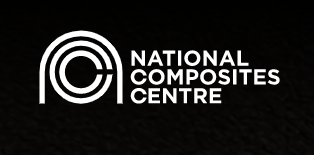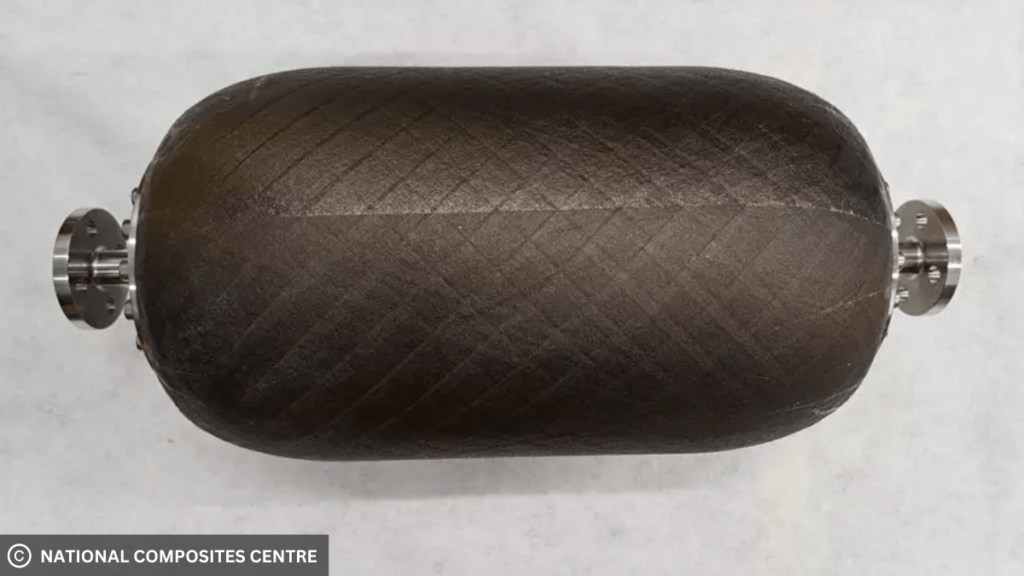
- UK-based test program will validate design toolsets and help the aerospace, transport, and energy industries accelerate design, manufacture, and test capabilities
- NCC is developing underpinning knowledge for composite cryogenic storage tanks, and testing it through product demonstrators with increasing complexity, to support UK’s transition to the hydrogen economy
- NCC has designed and manufactured a liquid hydrogen composite storage tank that will undergo testing
At JEC World 2023, the National Composites Centre (NCC) has announced a UK-based composite cryogenic storage tank testing program that will validate and accelerate design, manufacture, and test capabilities, starting with a linerless carbon fiber tank for storing liquid hydrogen (LH2).
Cryogenic storage tanks will be essential components in hydrogen-powered aircraft due to come into service in the mid-2030s. Most designs for storing LH2 have centered around metallic tanks, which are relatively heavy. Composite tanks developed in the space industry tend to be suited only for single use (low cycle) applications. However, commercial hydrogen aircraft will need fuel tanks to be as light as possible, filled and emptied numerous times (high cycle), and to last for several decades.
To support the UK’s transition to a low-carbon economy, the NCC is developing underpinning knowledge for composite cryogenic storage tanks and testing by developing product demonstrators with increasing complexity. Its team of specialist engineers have also created and built a range of comprehensive cryogenic concepting and design tools to help UK organizations overcome known engineering challenges critical to accelerating hydrogen development.
With no clear existing industry standards for aerospace cryogenic tanks, the ability to analyze a range of designs is essential. This led to the development of a range of concepting tools covering tank design space exploration, permeability, microcracking, thermal and mechanical stresses. These tools form a baseline toolset that can be used by industry for cryogenic tank projects, enabling detailed design and manufacturing risk identification and analysis. Understanding cryogenics at this fundamental level will enable the NCC to support a wide range of industries and applications, each facing separate but overlapping challenges.
Testing is a crucial part of the cryogenic tank development program, which currently requires access to specialist testing facilities. For example, LH2 requires well-insulated cryogenic storage vessels to maintain it at a temperature of -253°C, and handling requires specialist knowledge and equipment.
To develop a UK-based testing capability for its customers, the NCC has partnered with Filton Systems Engineering (FSE), a Bristol-based SME specializing in fluid system engineering, that owns and operates a hydrogen test facility capable of both gaseous and liquid hydrogen testing. Working in partnership with FSE, the NCC has developed a tank-testing program that uses an LH2 vacuum test chamber and cryo-rated testing instrumentation. As a world leading composites research and development center, the NCC has designed and manufactured five linerless carbon fibre demonstrator tanks, using a mix of automated fiber placement (AFP), tape winding, and hand lay-up composite processes. The tanks will be used for the liquid hydrogen testing program, starting at the end of April 2023, with results expected summer 2023.
Daniel Galpin, Advanced Research Engineer, NCC, stated “The cross-sector capability we’ve developed will enable UK industry to accelerate and advance engineering expertise in composite cryogenic storage, and secure future commercial competitiveness. Our comprehensive program will enable us to support customers on their journey to design, validate, manufacture, and test high-cycle composite cryogenic tanks.”
The NCC Hydrogen team is collaborating with partners and the supply chain to advance engineering expertise in composite cryogenic storage systems that will help the UK to achieve its net-zero ambitions. This builds on NCC’s investment in capability development for hydrogen pressure vessels and hydrogen smart pipes: two other areas that will help establish a strong H2 supply chain as the Government implements its UK Hydrogen Strategy to kick-start a vibrant hydrogen economy by 2030. Expertise and knowledge developed through the focus on cryogenics has enormous potential for numerous cross sector applications and will guide technology development.
For more information about accessing the NCC composite cryogenic tank testing, concepting and design tools, contact; hydrogen@nccuk.com
IMAGE (above): Cryogenic tank for storing liquid hydrogen (Credit: National Composites Centre)





